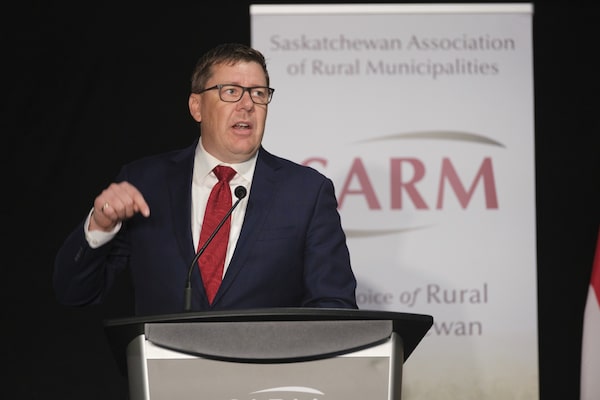
Premier Scott Moe speaks at the annual convention of the Saskatchewan Association of Rural Municipalities at Queensbury Convention Centre in Regina on March 16.Michael Bell/The Canadian Press
Saskatchewan Premier Scott Moe is urging the federal government to classify rail workers as essential and to ensure back-to-work legislation is passed if Canadian Pacific Railway employees go on strike.
Mr. Moe says the Saskatchewan Party government plans to deliver a petition to Ottawa this week calling for the change.
“I hope it finds its way to the floor of Parliament so they can have a discussion and prioritize what they can actually do to make a difference,” Mr. Moe said at a Saskatchewan Association of Rural Municipalities convention on Wednesday.
He also said he will raise the issue with other provinces.
The union representing the CP rail workers has said more than 96 per cent of its members voted in favour of a strike. The Teamsters Canada Rail Conference says wages, benefits and pensions are the main issues. Should contract talks fail, the union must give the company 72 hours notice before its members could go on strike.
Mr. Moe said a strike would affect goods transported across the province and would hurt industries already facing supply chain delays. It would be “catastrophic” on products moving into or out of Saskatchewan, including shipments of grain to the southern United States, he added.
“This simply cannot happen. I’m trusting and hoping the federal government is already considering to some degree what back-to-work legislation would look like.”
The Teamsters did not immediately respond to a request for comment.
A spokesperson for the federal Transport Minister’s office didn’t address the petition, but said the government is monitoring the situation and encouraging both sides to work together to reach a resolution.
Canadian Pacific has said the federal government has stepped in during eight of the past nine collective bargaining rounds it has had with the union. It said there have been strikes in the past three sets of talks since 2011.
“That’s a reason for them to formalize this into essential service legislation,” Mr. Moe said.
Ray Orb, president of the rural municipalities association, said it would be the worst time for rail workers to go on strike.
Recent droughts and issues related to the Russian invasion of Ukraine have worsened supply shortages, particularly for Saskatchewan and Alberta farmers who rely on grain, Mr. Orb said.
“There’s a large number of cattle concentrated in areas where really there is no feed. A lot of our farmers are stressed out already because there’s no hay. Some of them are running out of water and so this grain is crucial,” he said.
“If we run out of grain we’re going to have some issues in the livestock sector we haven’t seen ... before.”
Trent Wotherspoon, the Opposition NDP’s agriculture critic, said he’s hoping the two parties can negotiate a fair deal without government interference, while continuing to respect workers’ rights.
He said the NDP does not support Mr. Moe’s petition.
“The Premier is grandstanding when he should be crystal clear with CP that it’s clearly unacceptable to have a rail stoppage at this time and they need to negotiate a fair deal,” Mr. Wotherspoon said.
“This is the same Premier that couldn’t say boo about a serious trade blockade [by truckers] on our American border that had very serious consequences for agriculture producers and others in this province.”
Our Morning Update and Evening Update newsletters are written by Globe editors, giving you a concise summary of the day’s most important headlines. Sign up today.
This content appears as provided to The Globe by the originating wire service. It has not been edited by Globe staff.